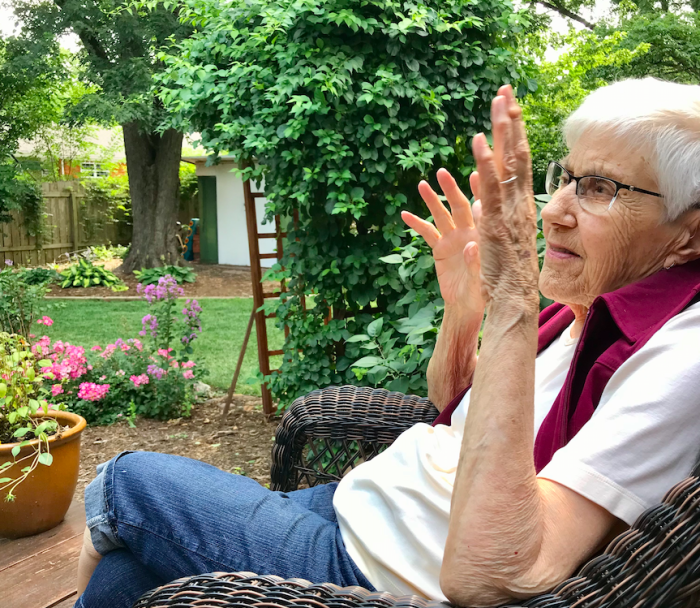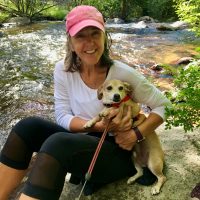Hannah possesses hands that could only and always be considered formidable.
Her father’s end of the gene pool gifted her the broad shoulders and strong glove-like hands that were needed for the life of a hard-working woman born into the Yutzy clan.
And Hannah worked—oh, yes, she worked. She picked vegetables and helped her mother prepare many meals from the ingredients that grew in the Ohio soil. She sewed on buttons, darned socks, and tied knots on quilts. She learned almost everything on the farmstead, except how to milk cows. Her father held out on this last task, taking no risk that she’d be relegated to the barn by a farmer husband. “I want you, Hannah, to go to college.”
So, Hannah went to school, then college, and her hands were used to write, to type, and to express herself expansively to the young children in her one-room schoolhouse. Always, like sturdy tree limbs, Hannah’s arms were raised in various forms of exclamatory motion: pointing out nouns, leading a song, holding a crying young one’s hand in comfort.
Raising her own children, her hands were used to instruct, admonish, and console. Her daughter remembers every motion of those hands as they prepared meal after meal, scraping every bit of the cornbread batter out of the bowl, whisking the eggs until they were frothy white, and cleaning, cleaning, perpetually cleaning. Our Lady of Cleanliness presided over Hannah’s kitchen. Her daughter memorized the motions of her mother’s hands in the long partnership that kitchen work was to become for mother and daughter.
Decades later, Hannah sits often with those strong, sun-spotted, slightly chilly hands in her lap. She reaches her generous hands toward family members when they come. “Look, my hands are cold,” she says. It’s an invitation to hold the formidable appendages that have become chilly with the decrease of blood flow due to inactivity. When she sees a loved one, her hands instinctively reach out to embrace. She waves her hands as she speaks and the words don’t tumble forth as they used to. Her hands are fluent, even as the words get stuck and Hannah searches the corners of her mind for what she longs to say. Her loved ones let the hands finish the incomplete thoughts.
Hannah’s daughter marvels at the miracle of muscle memory as they work in the kitchen when she brings her mother to her home. Hannah claims she doesn’t remember how to make things but when she is wielding a spatula, a measuring spoon, or a paring knife, her hands move in syncopated motion to scrape, pour, and peel. They are efficient and precise. “Here we are,” they seem to say. “We still remember how to do this work.”
Most times, it is through these shared work ventures, making crafts, or cooking that Hannah and her daughter are most at ease. Conversations get frustrating as Hannah can’t remember what she’s asked or how her questions have been answered. When Hannah’s daughter asks her to explain something she has said, Hannah finds that she can’t. Only stock phrases come out and Hannah and her daughter know they don’t quite fit, but pretend that they do for the sake of being present. When they work on something together; painting pictures, folding paper to make flowers, or fitting pieces into a puzzle, they are reunited as a team.
The memory of purposeful movement and the joy of cooperative work is restored. Hannah’s hands are at home then. By her side, a slightly younger pair of hands, identical in size and form, work alongside her and fulfill the harmony of their mutual love.
When they are done, Hannah’s hands reach out again as a blessing. “Thank you,” she says. “I loved that.” Both pairs of hands wave goodbye in unison, then lower slowly in synchronicity to steady them until the next time they come together.









Read 1 comment and reply